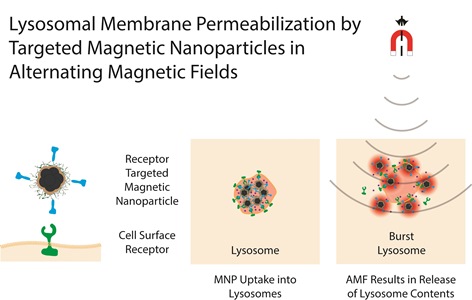Magnetic nanoparticles respond to applied alternating magnetic fields through a combination of physical particle rotation and internal dipole rotation, dissipating thermal energy to their surroundings. This thermal energy can result in a tissue temperature rise to the hyperthermia range (43-47°C), making it effective at killing cancer cells. Recent work by Professor Carlos Rinaldi, his students and collaborators has demonstrated that such thermal energy dissipation can be targeted to subcellular structures, such as the lysosome. In their recent paper published in ACS Nano, Professor Rinaldi’s group reports the targeted, selective permeabilization of lysosomes in breast cancer cells using magnetic nanoparticles that target the epidermal growth factor receptor (EGFR). The EGFR is overexpressed in many forms of cancer, making it an important molecular target. The contribution was highlighted in the nanotechnology new and views website, Nanowerk. Besides demonstrating a mechanism by which targeted nanoscale thermal energy delivery can be applied to destroy cancer cells without the need for a tissue temperature rise, the work described in the ACS Nano article points the way to application of magnetic nanoparticles to destroy small tumors, metastatic lesions, and perhaps even single cells, and could find application in enhancing cytoplasmic drug delivery.
Nanowerk highlight: http://www.nanowerk.com/spotlight/spotid=30908.php
Article link: http://pubs.acs.org/doi/abs/10.1021/nn4007048
